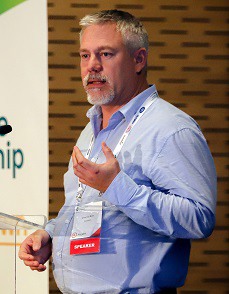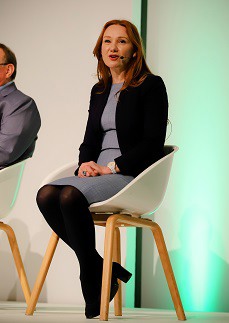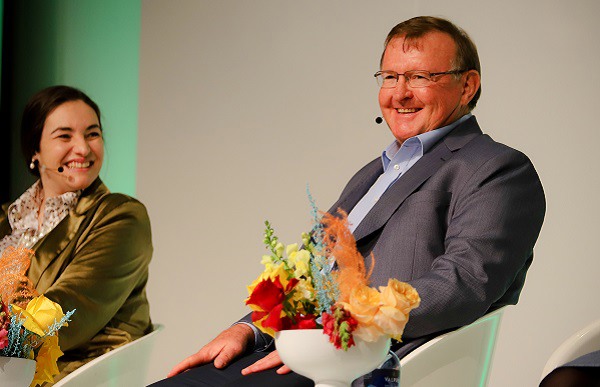 The real opportunity in Southern Africa, noted both Tommie van Zyl, ZZ2 CEO, and Charl Dubois executive officer of Capespan at last week’s IFPA conference, lies in decentralization.
The real opportunity in Southern Africa, noted both Tommie van Zyl, ZZ2 CEO, and Charl Dubois executive officer of Capespan at last week’s IFPA conference, lies in decentralization.
Charl Dubois from Capespan (photo: Brent Abrahams)
Charl referred to the tens of billions of dollars invested in South Africa in land, intellectual property, infrastructure brought by the fresh produce industry, but along with it comes distribution challenges when moving more really perishable product to more markets.
“If you look at what is happening in Namibia: they have 2,000 ha of grapes, they’re planning on 10,000 ha of citrus, they’re planning a new dam and there’s a private operator for Walvis Bay port. The ports of Luanda and Maputo also have private operators.”
View the IFPA2023 photo report.
Indeed, a recurring theme among conferencegoers was the awarding of the contract to run Durban’s pier 2 to Philippines-based International Container Terminal Services Inc. (ICTSI) which, Charl remarked, will move the needle.
South African companies are keen to invest in infrastructure, with the underperforming ports the low-hanging fruit. Given South Africa’s power problems, that’s where their minds are at: being as little reliant on government as possible.
The crisis of power cuts (a phrase Tommie van Zyl prefers to ‘loadshedding’) has presented South Africa with a big opportunity for energy decentralization.
“We need to align our strategies and collaborate instead of blaming and shaming," he said. "We just need to get the job done.”
In sustainability optics, fresh produce is eclipsed by big brands In the field of sustainability, which is taking centre stage in every big business, consumer goods products and big brands are leading the way, they’re setting the agenda on sustainability, Tamara Muruetagoiena from IFPA (right) told the conference.
In the field of sustainability, which is taking centre stage in every big business, consumer goods products and big brands are leading the way, they’re setting the agenda on sustainability, Tamara Muruetagoiena from IFPA (right) told the conference.
Everyone is aware of what a company like Patagonia or Nike was doing to mitigate climate change, because they tell their stories so well and they have populated the space for companies to talk about these things.
Charl added: "In the bigger scheme of things, agriculture often gets a bad rap: it’s monoculture and using pesticides and agrofertilisers but there’s a lot happening in the field of regenerative agriculture that we need to tell. We have a huge role to play in sequestering carbon."
This is a role that IFPA aims to fulfil: giving the fresh produce industry a voice on the global stage to explain how it is part of the solution.
View the IFPA 2023 photo report.
She maintained that the carbon footprint of the supply chain was becoming more efficient, after due emphasis, but there is much more opportunity to effect sustainability ahead of us, given climate change through production practices which sequester carbon and maintain biodiversity.
Only 18% of ZZ2's land is intensively cultivated, Tommie told the conference, while 62% are left intact as green corridors and habitat to render ecological services to the farm. The company has been a forerunner in bringing ecologists into the fold.

Westfalia's CEO Paulina Theologou-Criticos and ZZ2's CEO Tommie van Zyl (photo: Brent Abrahams)
At the mercy of uninformed packaging regulators
Ms Muruetagoiena calls regenerative agriculture and climate change mitigation through production practices the next frontiers in sustainability.
Alas, the conundrum of packaging is a Gordian knot.
“In the area of packaging we’re dominated by regulators, unlike other areas, and the ball is in their court,” she said; she was a sustainability professional in the fresh produce industry before moving to IFPA where she heads up this portfolio.
In other areas producers can grab the bull by the horns – sequestering carbon through regenerative practices (although Charl pointed out they can’t yet trade it for carbon credits in agriculture as in other spheres of the economy) and reducing the reliance on synthetic fertilisers which release nitrous oxide, but in this one area the fresh produce industry is wholly at the mercy of the regulators, she said.
View the IFPA 2023 photo report.
There is at the moment no replacement for plastic – although improved recyclability and higher recycled content are certainly the way to go – and instead of placing barriers in the way, regulators could rather assist the industry by infusing it with more money for innovation.
“We should educate regulators on why fresh produce needs packaging," she believes. "The EU Green Deal and new packaging regulations are giving everyone a huge headache.”
Paulina Theologou-Criticos, Westfalia's CEO, concurred on Tamara's point that sustainability was a change in a mind set.
"Opportunity in adversity will propel us. Any resource of this earth that you use to get that fruit on the plate should be used sustainably, renewably and minimally. It’s not going to stop being sold. The trick is to get it there regeneratively.”
